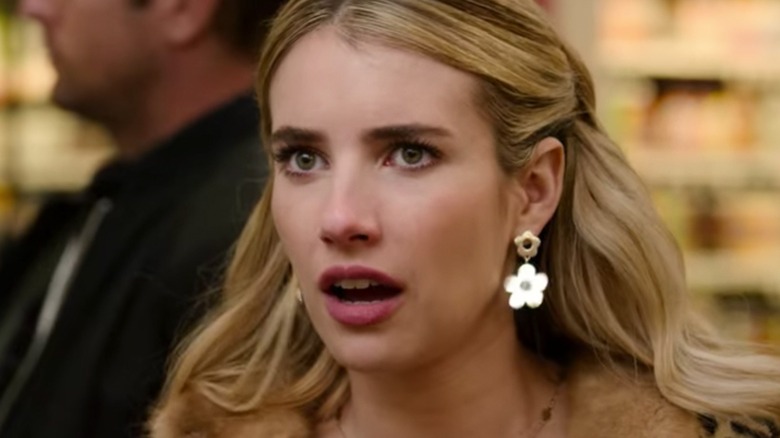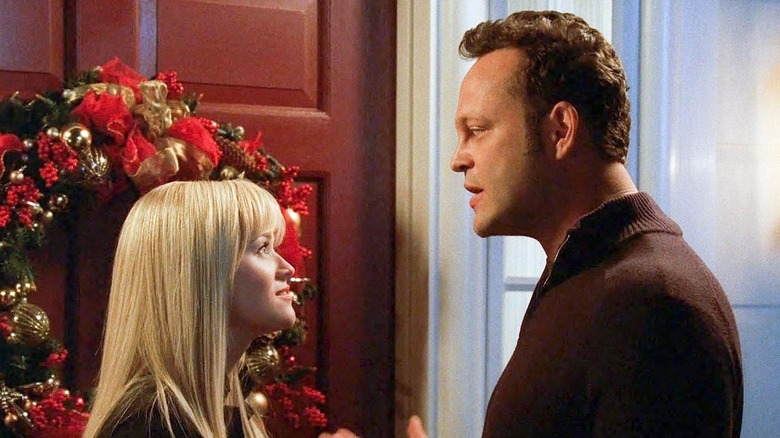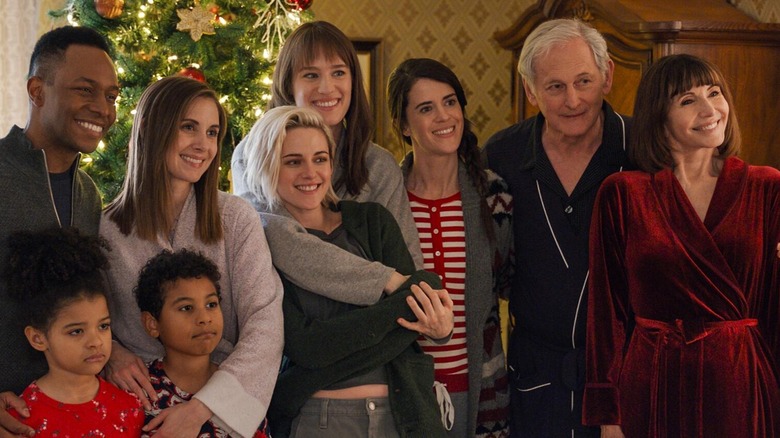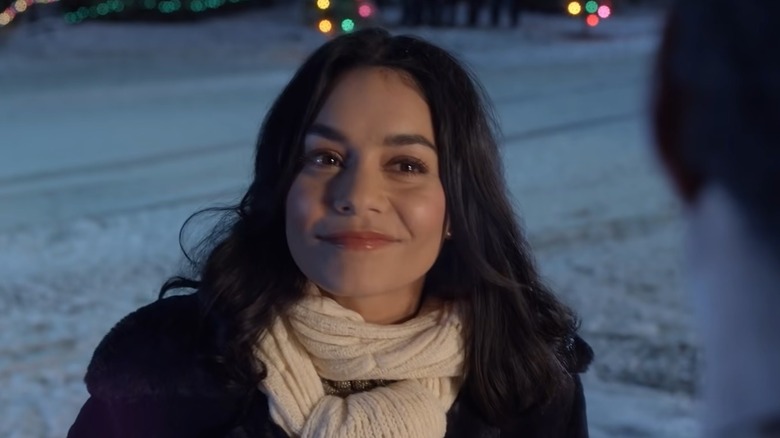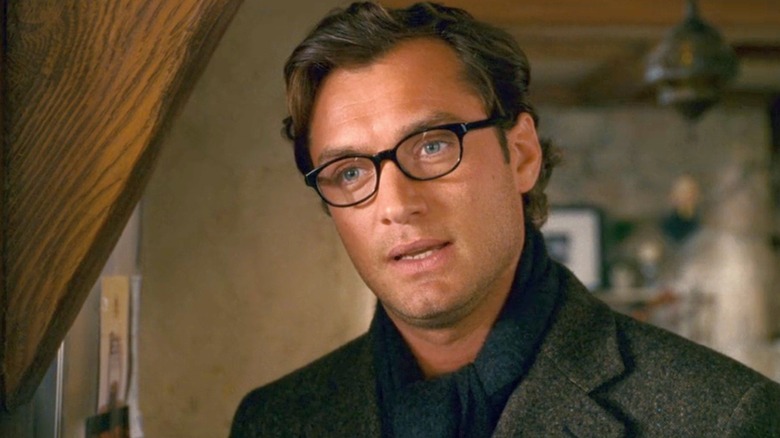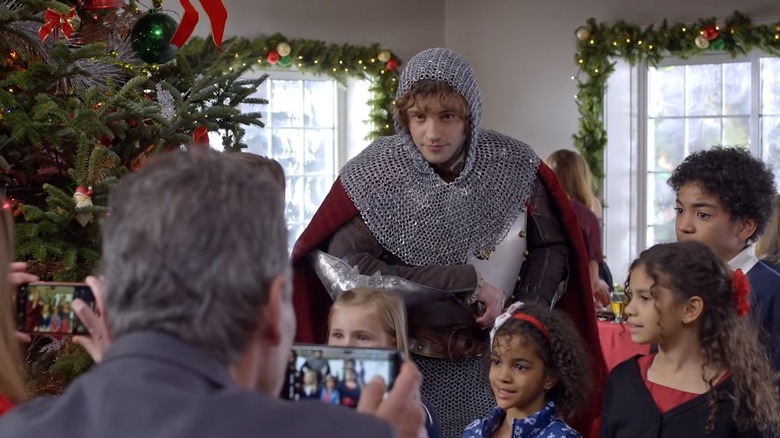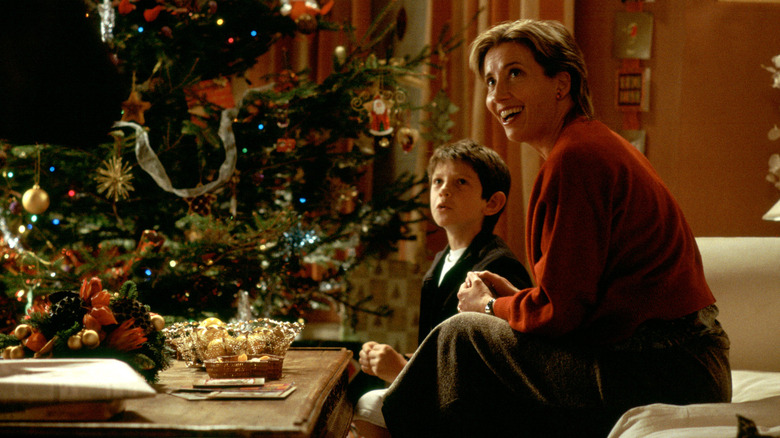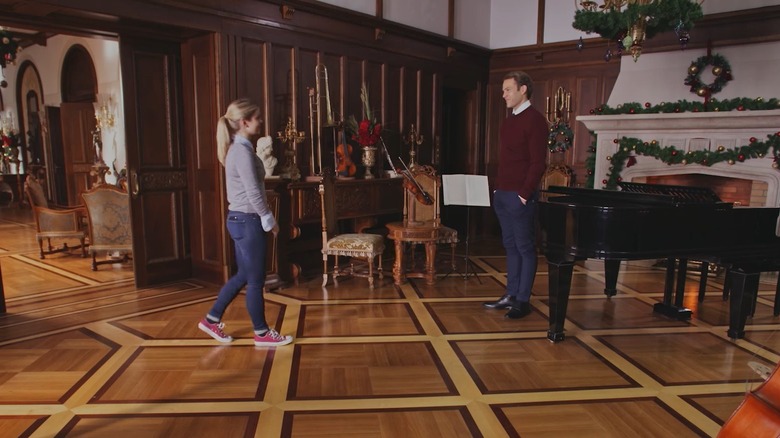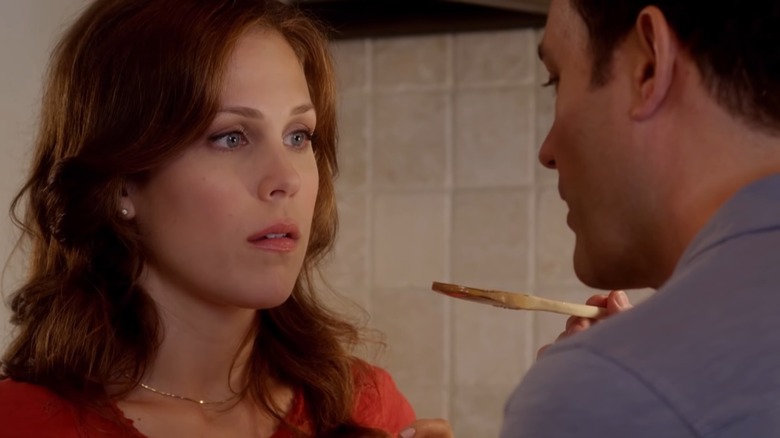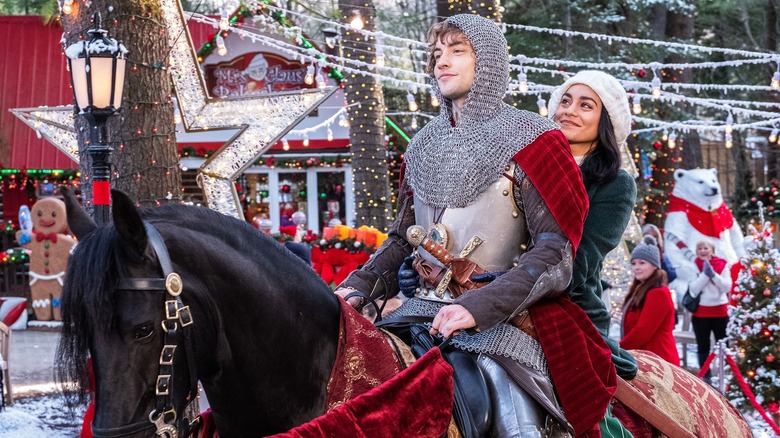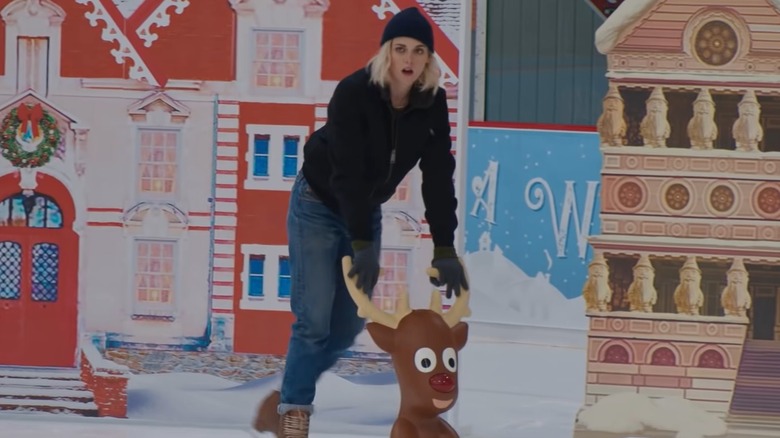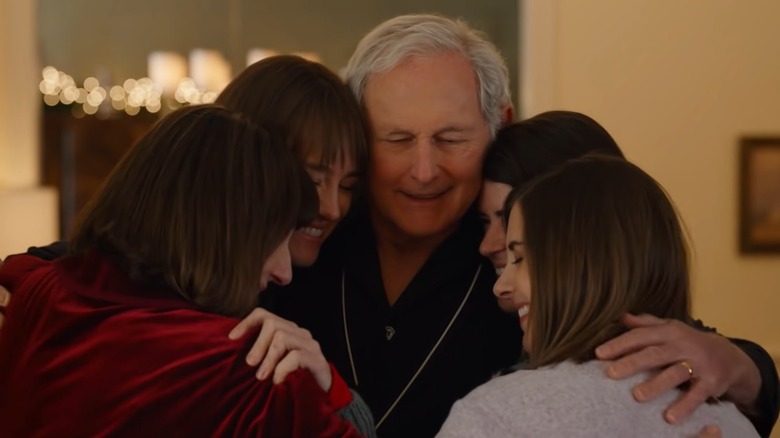Things You See In Every Holiday Romantic Comedy
The tree's been decorated. Candles have been lit. Perhaps you've just gotten through another workday during the holiday season. However you got here, it's the end of another bustling day in December. You want to unwind with a movie, but you're not in the mood for something heavy. Swooping to the rescue in this scenario is a staple of the season — the holiday romantic comedy.
Combining the sweetness of end-of-the-year holidays with the similar upbeat attitude of classic romantic comedies has yielded consistently lucrative results for producers and similarly successful results for viewers just looking for something frothy to watch. Some of these features have even entered the rotation of holiday season productions you simply must watch every December. Certain households can't say they've celebrated the holidays properly without a viewing of "Love Actually" or "A Christmas Prince."
Despite how beloved these movies are, even the most ardent fans of holiday romantic comedy would admit that there's a formula to these movies that ensures that a handful of traits creep into most, if not all, of its entries. Rather than ward away prospective moviegoers, the presence of such staples tends to be an attraction for devotees to the holiday romantic comedy, as these movies wouldn't feel the same without certain narrative hallmarks. With that in mind, let's grab a cup of hot cocoa and look at an assortment of things you see in every holiday romantic comedy.
A female lead defined by work, work, work
Every holiday romantic comedy needs a protagonist. For this genre, the ideal lead is a lady who starts the story defined by one thing: work. This character loves her job and has no time in her life for either a partner or the holidays. It's the perfect launchpad for a character to grow from, with the inevitable result being that she eventually finds room in her life for a career, romance, and candy canes.
Think of Emilia Clarke's protagonist in "Last Christmas," a wannabe singer who also works around the clock as an elf at a Christmas-themed shop. There's also the lead character of "The Knight Before Christmas," portrayed by Vanessa Hudgens, a high school science teacher who is far more enamored with grading tests than she is interested in meeting Mr. Right.
This trope helps set up a climax filled with yuletide-defined personal growth, where a character realizes that work can't be the only thing that defines a person. It also provides a feasible obstacle for this grounded genre. Conflict in the holiday romantic comedy domain cannot emerge from something rooted in science fiction or too heavy lifted from a realistic drama. Explosions and sudden bouts of existential dread would disrupt the aesthetic people show up to these movies for. Being too consumed with work strikes the right balance between generating problems but not disrupting the tender tone of a holiday rom-com.
It's time to return home
When you're a kid, Christmas is defined by racing out of bed at the crack of dawn on December 25 to unwrap presents under the tree in your cozy living room. When you're an adult with an independent life, that home can now be a place that can seem daunting to return to. It might be the space where overbearing relatives and awkward questions from your parents reside. The sheen of childhood is gone and replaced by the imperfections of adulthood. All that bickering and passive-aggressive remarks from your loved ones can make for such troubling holiday season experiences that you never want to go near a family gathering ever again.
At least they also help inform another storytelling crux of many holiday romantic comedies — returning home. Having to go back to a parent's house plays at least a part in the plot of many of these movies. It's so prominent in the genre that the 2008 Vince Vaughn and Reese Witherspoon feature "Four Christmases" wrapped its story around not one but four different voyages back to awkward familial reunions. This concept is also at the heart of "Happiest Season," while an estranged family reuniting for a Christmas gathering at their estate is the focus of the Hallmark feature "Coming Home for Christmas." Returning home for Christmas can be a stressful process, but at least you can giggle at it when watching a holiday romantic comedy.
An overbearing relative
Going hand-in-hand with returning home means encountering relatives that drive you up the wall. This is such a standard fixture of the holiday season that holiday romantic comedies regularly feature these characters as an easy way to stir up conflict. Sometimes, these are just supporting players who show up for a brief scene. Other times, they're the crux of the plot, like the assortment of overwhelming relatives that Candace Cameron Bure's protagonist in "Christmas She Wrote" has to deal with after losing her job as a columnist.
This plot thread also serves as a critical ingredient for "My Christmas Family Tree." In that film, intrusive family members help show the discomfort Aimee Teegarden's lead character, Vanessa, feels as she navigates spending the holidays with a family she didn't even know she had before taking a recent DNA test. On and on the list goes, with so many holiday romantic comedies making use of either one or multiple overbearing relatives.
Just as predictable as the presence of overbearing family members can be in the movies, fans can also expect that movies like "Four Christmases" and "Happiest Season" will feature heartfelt climactic reconciliations between the protagonist and their most aggravating relatives. It's the holidays, for goodness sake. Can't we all just get along?
Female lead is jaded about romance and Christmas
The women that headline holiday romantic comedies can't just be obsessed with work. That would render them one-note! These characters also must start the story with an adverse hostility to romance and be 110% jaded about anything connected to the holiday season. It's another staple of this genre that allows these fictional figures room to grow over the course of date nights and holiday traditions. It also serves the function of hooking in viewers who're cynical about holiday-themed romantic comedies before hopefully drawing them in to get invested in some Yuletide schmaltz.
The protagonist of "Holidate," Sloane Benson (Emma Roberts), is a perfect modern example of this hallmark, and the same goes for Abby (Kristen Stewart) in "Happiest Season." Even in stories involving fantastical elements, like the time travel yarn of "The Knight Before Christmas," the female lead is still bound to be jaded about the idea of finding true love and the holiday season.
This is a detail in this subgenre that has its roots in other types of motion pictures. Similarly, cynical female protagonists have been common in general romantic comedies for decades, particularly in star vehicles for the likes of Jennifer Aniston and Sandra Bullock. Given the ubiquity of this archetype, it should be no surprise that the ladies who headline holiday romantic comedies also tend to start as a pessimistic bunch.
The standard male lead
The almost exclusively heteronormativity of the holiday romantic comedy subgenre means that these films are usually concerned with a girl meets boy scenario. What guy will this lady protagonist end up with? Traditionally, these projects conjure up a male lead that won't be threatening to its target demo. This character must be hunky, but not aggressively so. He doesn't have muscles the size of a tire, but he's totally more attractive than someone you'd run into in your average line at Starbucks.
Most of these characters carry the personality trait of being fond of Christmas, which usually serves as a contrast to the jaded female lead. Many of them are also single fathers, an attempt to immediately demonstrate to the viewer that these guys are capable of emotionally committing to people. Many holiday romantic comedies feature male leads that live up to at least most of these traits, but the quintessential example of one of these types of characters is Jude Law in "The Holiday."
Law's no stranger to playing handsome people that dance around the romantic imaginations of moviegoers. Here, though, his ability to provide festive smooches and also be goofy by turning into Mr. Napkinhead around his daughters made him the ultimate holiday romantic comedy male lead. Other entries in the genre have been trying to chase this lightning in a bottle of a character ever since.
Wry self-referential dialogue about the genres tropes
If you're watching a modern entry in the holiday romantic comedy genre, you better like lampshades, because that's what you'll find wrapped under the tree. The holiday romantic comedy has become such a staple of the modern cinema scene that it's only natural that the storytelling hallmarks of the genre would also become familiar to audiences. Newer entries in this genre now must straddle a fine line between recognizing the intelligence of the viewer without engaging in overly subversive storytelling that would disrupt the easygoing flow of these movies,
Thus, you have moments like Harper (Mackenzie Davis) in "Happiest Season" winking to the audience by mentioning how some of her fondest childhood memories were enjoying schmaltzy Christmas movies on TV. This quasi-post-modernist approach means that holiday rom-coms even parody known hallmarks of other Christmas media, such as the inclusion of a karaoke scene in "Love Hard" where characters comment on the outdated lyrics of "Baby It's Cold Outside." With these tactics, the holiday romantic comedy can have its cake and eat it too by recognizing that storytelling clichés exist in this genre while still using them to deliver easy emotional catharsis to the viewer.
Long-simmering personal drama coming to a head
It isn't just the presents that are waiting to be unwrapped in a holiday romantic comedy. There's also lots of family drama that's bound to be uncovered once so many relatives are under one rooftop. "Happiest Season," for example, features the main character Harper and her sister Sloane (Alison Brie) constantly at each other's throats due to a competitive streak that's existed between the duo since childhood. Coming together for a Christmas get-together, it's only inevitable that outings like ice skating would bring up their barely-contained conflict to the surface.
This drama can even exist between couples, such as in a star-studded segment from "Love, Actually," in which a married couple played by Alan Rickman and Emma Thompson have their long-term marital problems put under the microscope when Rickman's character begins an affair. Issues between loved ones don't appear out of nowhere. They tend to ferment over long periods. Holiday romantic comedies are thought of as the soft sugar cookies of cinema, all sweetness with no bite. However, even they're conscious that the most wonderful time of the year can be difficult when loved ones finally confront their biggest problems with one another.
The break-up and then reunion in time for Christmas
Holiday romantic comedies have no problem adhering to traditional storytelling templates. In particular, these films love a story structure that indicates the second act must end with an all is lost moment before the main characters jump back into action to set things right in the third act. It's a process that's worked for so many other movies, and that includes some of the most famous entries in the holiday romantic comedy subgenre.
"A Christmas Prince," for example, features leads Amber (Rose McIver) and Prince Richard (Ben Lamb) splitting up right after a slew of revelations that include how, up to this point, Amber has been lying to Richard about her real identity. Don't worry, though, moviegoers. Tears will be shed, but after Amber and Richard have separate conversations with critical supporting characters, they'll race back into each other's arms just in time for the big marriage proposal finale.
Other entries in this merry subgenre, ranging from Hallmark Christmas fare to the acclaimed Nancy Meyers feature "The Holiday," also utilize this storytelling tactic. It is all in the service of instilling a sense of doom in the audience before raising their spirits back up for a rousing climax.
Baking! Lots of baking!
It just wouldn't be the holiday season without baking. Lots and lots of baking. In the real world, the various holidays that dominate the final month of the year usually entail plenty of cookies, brownies, and other confections being cooked alongside dinnertime staples like ham or turkey. Naturally, then, holiday romantic comedies have also taken to regularly featuring the process of baking in their storylines. If people are getting cozy during a time of the year where snow covers the ground, chances are they'll eventually bond over a cooking montage.
One production company that regularly has utilized baking in holiday romantic comedies is Hallmark. Their features don't just utilize baking for a scene. They have built entire stories out of the process of making festive treats. Projects like "A Cookie Cutter Christmas" and "The Sweetest Christmas," the latter of which revolves around the fictional American Gingerbread Competition, are just a few examples of Hallmark Christmas movies oriented around this fixture of the holiday season. Of course, they're far from the only holiday romantic comedies to feature this tradition, but they are a prime example of just how prominent baking can be in this subgenre.
It's always about middle-class and upper-class characters
One more uncomfortable recurring facet surrounding the holiday romantic comedy is its emphasis on middle-class and upper-class characters. This subgenre has shockingly little consciousness of people in lower economic brackets, despite this being the demographic these movies often appeal to. If a character does come from a lower rung of society, don't worry, they'll achieve personal growth through the possession of exorbitant wealth soon enough. Just look at "A Christmas Prince" protagonist Amber Eve Moore (Rose McIver), an American journalist whose eventual dream scenario is to marry a prince who gives her lots of wealth and power.
Meanwhile, "Christmas Inheritance" follows wealthy heiress Ellen Langford (Eliza Taylor) as she discovers the shocking truth that poor people from everyday New England towns are human beings too. The residents of this locale that Langford encounters exist only to justify the humanity of the proletariat to the bourgeoisie.
Even characters that are supposedly strapped for cash live in apartments that dwarf the homes of many viewers. Granted, this isn't a problem exclusive to romantic comedies, as sitcoms and superhero movies also have a bad habit of lingering on the upper-crust, and nobody's expecting a consciousness of poverty on par with a Sean Baker movie when watching "The Knight Before Christmas." Still, the limited empathy for people in lower economic classes throughout the holiday romantic comedy genre adds an uncomfortable undercurrent to this frothy strain of cinema.
Importance of a childhood memory
Christmas and other holidays are widely associated with childhood, and why shouldn't they? Many of these festive days are like a dream come true for youngsters since they involve lots of presents and eating extravagant sweet treats. While holiday romantic comedies center on adult protagonists, they're also conscious of how important nostalgic memories of adolescent holiday season experiences are for people. Thus, many entries in this subgenre feature a critical plot point involving a childhood holiday season memory from the main character. It's an easy way to generate an instant connection between the viewer and in-movie characters, not to mention these memories provide fodder for moments of schmaltz.
The prominence of this element varies greatly vary from one holiday romantic comedy to another. "Christmas on Honeysuckle Lane," for example, makes wistful memories of Christmases past a crucial part of its plot, which concerns a group of siblings preparing to put their childhood home up for sale. Others use this plot detail as a smaller part of a narrative tapestry. For instance, "Happiest Season" employs the perfect memories of past Caldwell Christmases as a way to set up extra high expectations for a Christmas at which Harper Caldwell's sexuality could get revealed. However it manifests, chances are your average holiday romantic comedy is bound to use childhood memories of prior holiday seasons.
A cozy Christmas finale to cap things off
Arguments have been had. A priceless family heirloom has been broken. A seemingly impossible romance looks like it's going to pan out. What's left to do by the time the holiday romantic comedy is winding down? Well, that's when it's time for a closing sequence depicting a cozy Christmas morning! What better way to send the audience home with a feeling of warmth in their hearts than to show people unwrapping presents and snuggling on the couch together?
The most notable example of this trend is the 2020 film "Happiest Season," which ends with a previously fractured family embracing their lesbian daughter and her girlfriend. The dad of the family even calls off a major political donor for his city council campaign since getting all that cash would involve hiding his daughter's sexuality. Granted, such a conventional and straightforward happy ending feels a little out of place with a movie that's grappled with heavy subjects like being forced back into the closet.
However, "Happiest Season" is indicative of how holiday romantic comedies use Christmas morning as the perfect point to pause their stories and end the proceedings on a cheerful note. This also occurs in "The Knight Before Christmas," which features the two main characters rekindling their romance on this special morning at the appropriately titled Christmas Castle. In holiday romantic comedies, anything can happen, including the happiest of happy endings, on Christmas morning.
